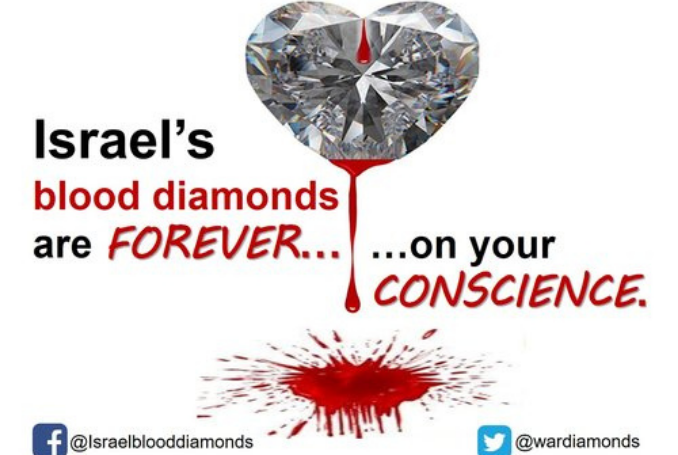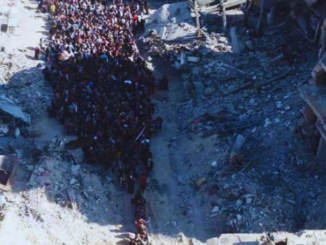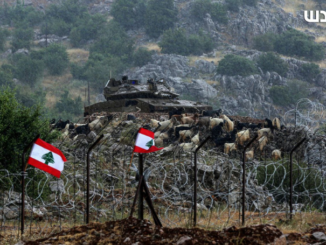
By Sean Clinton
As members of the Kimberley Process (KP) gather in plenary in Botswana this week the diamond industry is under pressure to ban trade in Russian diamonds that fund war crimes in Ukraine but not diamonds that fund war crimes in Palestine.
The double standard and hypocrisy of luxury brands could hardly be more blatant considering the rapid exodus of leading jewelers from Moscow after the Russian invasion of Ukraine and their silence in the face of the escalating death toll of Palestinian civilians and those resisting Israeli attacks and occupation of the West Bank and Gaza.
Although a press release by the Kimberley Process Civil Society Coalition makes a number of important points about revenue from diamonds, rough or polished, maiming women and children, funding dispossession and occupation being labeled conflict-free the statement cites Russia and stops short of naming Israel but the parallels are there for everyone to see.
Five weeks after the invasion Ukrainian president Zelensky called for sanctions on diamonds that fund the Russian occupation and war crimes.
After decades of Israeli occupation and war crimes, the Palestinian president has still not called for sanctions on one of Israel’s leading exports, the single biggest net source of foreign currency needed to sustain and enforce the settler-colonial apartheid project in Palestine.
The net value of Russia’s diamond exports in 2021 was $4.4 billion. Russia’s military expenditure in 2022 was $48 billion. The net value of Israel’s diamond exports in 2021 was $4.3 billion. Israel’s military expenditure in 2022 was $20 billion.
The case for sanctioning Israeli diamonds is far more pressing considering that diamonds are a much more significant source of funding for apartheid and war crimes in Palestine.
Unless and until Palestinian civil society calls for sanctions on Israeli diamonds, neither the Kimberley Process nor jewelers will do anything to end the trade in Israeli diamonds.
But while each member has a veto the KP will never agree to impose sanctions on Israeli diamonds just as it has been unable to agree to sanction Russian diamonds.
However, leading jewelers including Tiffany’s, Cartier, De Beers, Signet Jewellers, and others quickly moved to cut Russian diamonds from their supply chains once the link to war crimes in Ukraine was exposed. The same will happen to Israeli diamonds if consumers are alerted to the role the industry plays in funding the settler-colonial apartheid regime which has killed over 160 Palestinians including 20 children in the West Bank so far this year.
Corporations have onerous fiduciary responsibilities and must ensure their supply chains do not contribute to violations of international human rights law or international humanitarian law, a fact exemplified by the prosecution of executives of Swedish Company Lundin Energy.
Consumers are kept in the dark about the trade-in diamonds that fund Israeli apartheid and war crimes that flood the market labeled conflict-free. The industry and vested governments have created a matrix of Schemes, Codes of Practice, Best Practice Principles, and a System of Warranties that facilitate the cover-up.

Israel is a major player in the global diamond industry, both as a trader of rough diamonds and a manufacturer of cut & polished diamonds
Up until 2014, Israel imported about $5 billion in rough diamonds each year from Africa, Russia, and Canada. Many are imported via Antwerp.
In 2014 Israel’s diamond exports were worth over $21 billion gross ($11 billion net) and accounted for 30% of manufacturing exports.
Since 2014 Israel’s diamond exports have been in sharp decline. Even before Covid, they were falling, down 21% to $2.62 billion in the first nine months of 2019.
With the normalisation of relations with the United Arab Emirates, a major diamond trading hub, authorities in Israel hope to revive the diamond industry. The trade has recovered strongly in the first half of 2022.
Supporters of Palestinian human rights have been pressuring companies to divest from the Israeli diamond industry. Since 2019, Anglo American, which owns De Beers, has come under pressure from shareholder activists who have exposed the company’s claims that their diamonds are conflict-free. Some of De Beers’ business partners have directly funded the Israeli military.
In 2020 De Beers divested from A. B. T. Diamonds Ltd. weeks after shareholders lodged a complaint with the Advertising Standards UK citing the company for making significant donations to the Israeli military.
In 2017 Tiffany and Co. divested from a Beny Steinmetz-owned mine in Sierra Leone after activists exposed the link to the Givati Brigade responsible for the Samouni family massacre in Gaza.
In 2014 Sotheby’s had to take back the Steinmetz Pink diamond which they sold at auction months earlier for a world record $83 million. The buyers defaulted without penalty or explanation. Months prior to the auction a registered letter and email were sent to Sotheby’s CEO warning of the risk to the company’s brand and reputation posed by their partnership with the Steinmetz Diamond Group.

At about the same time, the long-established Steinmetz Diamond Group was rebranded as Diacore in a move that distances leading jewelry brands De Beers, Tiffany’s and Sotheby’s from the Steinmetz brand and the Samouni family massacre.
During the 2014 war, the Israeli diamond industry sent “trucks of equipment” to soldiers committing war crimes in Gaza.
The Kimberley Process Civil Society Coalition (KPCSC) is one leg of the tripartite Kimberley Process Certification Scheme along with the World Diamond Council and the 80 member states which are the only ones with voting rights – each with a veto to block changes they don’t agree with.
The KP has been unable to reach an agreement to change the definition of a “conflict diamond” which is restricted to rough diamonds that fund rebel violence against legitimate governments. Blood diamonds that fund war crimes or crimes against humanity by government forces evade regulation and are labeled conflict-free.
Palestinians are not represented in the KPCSC and so their voices are not heard around the KP table when vested governments make decisions about which blood diamonds should be banned and which can be labeled conflict-free.
Palestinians have arguably suffered longer and far more than any other community impacted by the diamond industry.
No other community has suffered the horrendous devastation, loss, and suffering caused during the multiple bombings of Gaza from land, sea, and air.
No other communities have had to endure the cold-blooded murder of thousands of children and innocent civilians including journalists and medics along with blatant discrimination, oppression, home demolitions, attacks by settlers and authorities, theft of land and resources, and arbitrary arrests and detention without charge or trial as Palestinians have.
Diamonds that are a significant source of funding for an apartheid regime guilty of grievous human rights violations are every bit as bloody as those that fund rogue regimes in Africa or Russia.
Platitudes have only emboldened Israel. Palestinian civil society should demand that the jewelry industry end the trade in diamonds from Israel which subjugates and brutalizes them daily.

– Sean Clinton is a human rights activists from Ireland with a particular interest in Israel/Palestine and the role diamonds play in funding the Zionist project in Palestine. He has authored several articles about the double-standard in the diamond industry which facilitates the trade in cut and polished blood diamonds. He contributed this article to PalestineChronicle.com.







